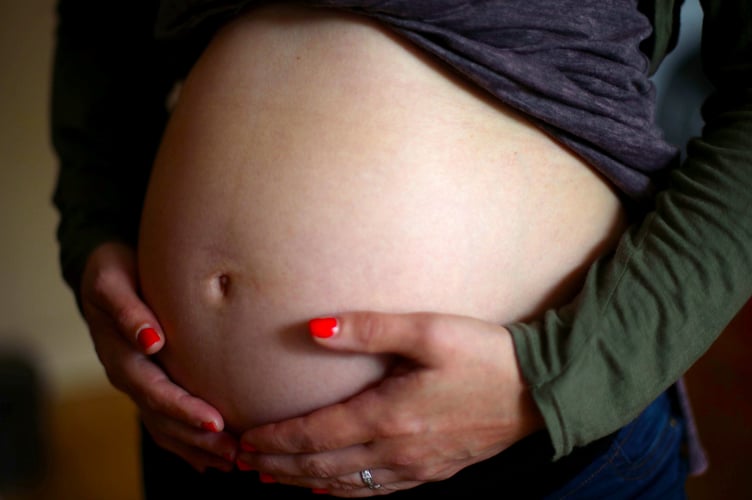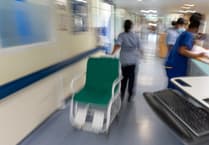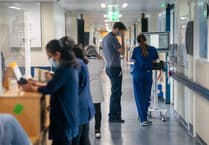A fifth of births recorded at the Royal Surrey County Hospital in March were emergency C-sections, new figures show.
While a caesarean section is generally a very safe operation, NHS England guidance states the level of risk partly depends on whether the procedure is planned or done in an emergency.
A pregnancy and baby charity warned emergency C-sections carry risks despite sometimes being "life-saving", adding their increasing rate in England likely reflects the "ongoing pressure on maternity services".
NHS England figures show around 55 (20%) of the 270 deliveries recorded at Royal Surrey County Hospital NHS Foundation Trust in March were emergency C-sections.
It was a lower caesarean rate than 28% a year earlier, but an increase from 18% five years ago in 2020.
At the trust, 43% of deliveries were spontaneous vaginal births in March, 7% had instrumental assistance and 30% were planned caesarean sections.
Meanwhile, across England, emergency C-sections accounted for about 11,160 (25%) of all 44,475 births recorded.
It was up slightly from 24% a year earlier, and a jump from 16% five years ago.
Amina Hatia, midwifery manager at Tommy’s, warned the increasing rate of emergency C-sections is "concerning", adding it probably reflects the ongoing pressure on maternity services.
She said: "These system-level issues can directly contribute to more unplanned interventions, and while emergency caesareans can be lifesaving, they are also more likely to be associated with complications and psychological impacts for parents.
"We know from listening to families that emergency procedures – especially when unexpected, rushed, or poorly communicated – can increase the risk of birth trauma and contribute to longer-term mental health challenges, such as post-traumatic stress disorder or postnatal anxiety.
"This is why safe, personalised care and continuity of support are so crucial."
Kim Thomas, chief executive of the Birth Trauma Association, said the increasing number of emergency C-sections could be due to several factors, including a rise in obesity and doctors becoming more risk averse.
She added the NHS encouraged trusts to keep the caesarean rate to no more than 20% of births until 2022 – a target that has since been dropped.
She said this could mean trusts are no longer trying to cap the number of C-sections.
Although she said emergency caesareans tend to be riskier than planned procedures, she warned limiting their use can result in "even worse outcomes".
"The problem with attempting to keep the caesarean rate low is that women who desperately need them are often denied them, and the result can either be a very risky late stage caesarean or a very traumatic forceps birth that, in some cases, can cause lifelong injuries including bowel incontinence.
"The goal of everyone should be to make sure that each woman receives the best possible care that’s appropriate to her needs at that time."
Professor Ranee Thakar, president of the Royal College of Obstetricians and Gynaecologists, said both vaginal and caesarean births present benefits and risks, and added "it's vital that women are given personalised information to make informed decisions about how and where they give birth".
She explained an increasing rate of "complex" pregnancies contributes to "major shifts" in how women give birth, leading to more planned and emergency caesarean births.
"Providing care to more women with complex pregnancies is placing growing pressure on maternity services and we urgently need to see governments and NHS leaders supporting services to adapt – with the staffing, facilities, and funding needed to support informed birth choices and better outcomes for families.
"It is vital that the national review announced on Monday is done quickly, builds on the evidence from previous maternity investigations and produces a definitive set of recommendations that galvanises action across the system."
Health Secretary Wes Streeting launched an investigation on Monday into NHS maternity services following a series of maternity and neonatal care scandals.
The Department of Health and Social Care said the investigation would "drive urgent improvements to care and safety" and "provide truth to families suffering harm".
Officials said the investigation would examine the entire maternity system, including an urgent review into the worst-performing services, and it is expected to report back by the end of the year.
An NHS spokesperson said: "It is vital to listen to every woman, respect their views and help them to achieve the type of birth they want – so that they receive safe and personalised maternity care according to best practice guidance and informed by evidence.
"Our priority is always the safety and wellbeing of mother and baby, and in some cases this means an emergency caesarean is the safest option."




